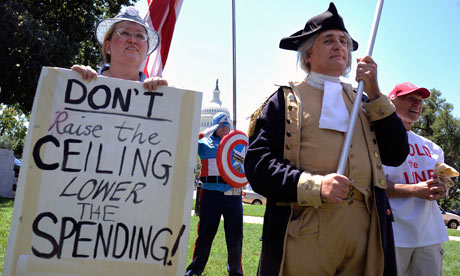 The Tea Party's campaign to permanently disable the US government inflicted a massive toll on the US economy, according to a series of recent reports. Let's start with consumer confidence:
The Tea Party's campaign to permanently disable the US government inflicted a massive toll on the US economy, according to a series of recent reports. Let's start with consumer confidence:U.S. consumer confidence fell sharply in October as Americans reacted to the Congressional impasse over the debt ceiling and 16-day partial government shutdown earlier this month, according to a survey released Tuesday by The Conference Board. The independent research firm reported the index fell more than expected to 71.2 from 80.2 in September. Economists surveyed by Bloomberg expected an October figure of 75. Those expecting business conditions to improve over the next six months fell to 16 percent from 20.6 percent. The drop in confidence was the biggest decline since August 2011, when lawmakers were also battling to reach a budget deal and threatening a government shutdown.
Consumer confidence plays a key role in macroeconomic performance as a loss of confidence leads to less spending on everything from Halloween to tourism which in turn chills jobs growth and constricts employment opportunities.
The loss in jobs was manifest today in the latest payroll report, as reported by economist Mark Zandi:
The government shutdown and debt limit brinksmanship hurt the already softening job market in October. Average monthly growth has fallen below 150,000. Any further weakening would signal rising unemployment. The weaker job growth is evident across most industries and company sizes.
As recently as April, the economy was creating 224,000 jobs per month. Essentially, the Tea Party leadership is now tossing over 75,000 American families under the bus for no apparent reason. Job growth already suffered from the sequestration cuts demanded by the Tea Party in 2011--by as much as a million jobs per year.
The bottom line is that the Tea Party leadership inflicted massive economic damage on the US economy through its constant flirtation with default. According to a USA Today survey of 41 top economists the tab is likely to amount to $27 billion over the next six months--from the most recent budget battle alone.
I am slowly coming to the conclusion that many Tea Party leaders hate America through their actions regardless of their words. Mainstream GOP voices increasingly recognize the damage the Tea Party is inflicting. As longtime GOP supporter and Home Depot founder Ken Langone asked a GOP House member: "What the hell did you guys gain by shutting the government down other than to get a black eye for all of us?" The response from House Republican Policy Committee Chairman James Lankford of Oklahoma: "I would agree. We got a black eye on it. The problem that we have is we overreached."





